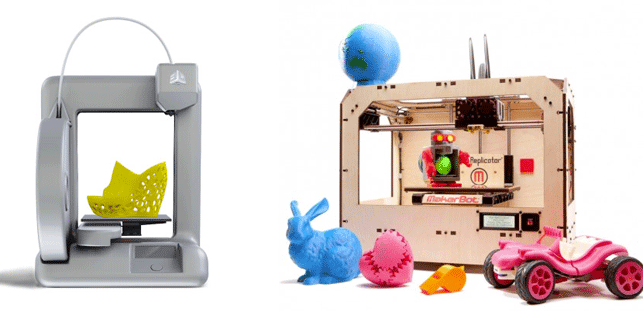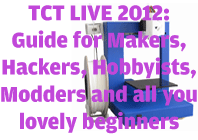
So what’s it going to be? A Cube (left) or a Makerbot?
If you’re planning on undertaking a 3D printing adventure in the coming months – whether it’s for business or pleasure – then getting as much information as possible about the different types of materials, machines, and various costs is going to be key.
TCT Live is launching its own exhibition area aiming to help out first-timers, regardless of whether you’re wanting to print paperclips or prototype planes.
What to check out?
It’s going to be a good idea to have a rough idea of what you’re wanting to do first before you stumble into a giant exhibition hall and spend your family’s holiday budget on the first 3D printer a salesman drags you in front of.
Are you wanting to buy an actual printer for home or workshop use? Can you get better/more cost effective results using a bureau service? Do you require a high finish to your print offs, or will rough dimensions do?
If you’re already clear on all the above then here’s what’s on offer.
Online 3D printing bureaux
iMaterialise is the online arm of one of the world’s largest and respected 3D printing firms – Materialise. It’s UK branch will be at TCT Live with an abundance of expertise to help you devise a plan regardless of the size of the project.
Sculpteo are another online bureau with an incredibly simple step-by-step process and even an App for Apple devices that allows you to upload prints while on the move, with results coming in a number of finishes.
Both offer a wide range of printed materials, from rough plastics, high quality plastics, ceramics all the way to titanium, sterling silver and 14 carat gold. Although prices will vary enormously, it gives you a lot more scope than simply owning your own machine, and the bureau will always have the most up to date technology.
3D printing bureaux (with faces)
Hoping to learn something along the way? The majority of the UK’s 3D printing bureaux are ran by cheery men and women, eager to offer you a bargain for your custom, and proud to explain the techniques and graft that they’ve put into the end piece.
These are usually the people doing the hands-on work so can recommend materials and process that will get you the exact product that you were after, and should you have any last minute changes they’re only a phone call away.
Some names that continue to crop up in our list of trusted-decent-types* include: IPF (using Objet and EnvisionTEC printers), Laser Prototypes (wide range of SLA and SLS machines and materials), and even Star Prototype – based in China – which takes advantages of the fast turn-around time of its workforce and international delivery to get prints to your doorstep.
Entry-level printers
If you’ve decided that having your own printer is for the best then you have an abundance of choice of starter printers.
The boom in ‘personal printing’ means that you can get more bang for your buck – although they are a lot more ‘unpolished’ than the products from the industry’s big guns.
– A1 Technologies will have its Maxit 3D printer using PLA (Polylactic Acid) which, being made from wood fibre, is fully biodegradable.
– Denford will be offering the UP! 3D printer, a readily assembled printer using ABS plastic.
– Ultimaker is another PLA printer with Meccano-esque looks, although it is still capable of getting down to a 0.01mm resolution.
– Makerbot is the most publicised and professional-looking out of this bunch, although its base model Replicator is still a simple ABS printer with a build area the size of a loaf of bread.
Options from the big boys and more upmarket choices
The big players from the professional 3D printing market are keen to expand into the lower levels of 3D printing, and as a result have some excellent options if your budget can stretch far enough.
– 3D Systems‘ Bot Mill and RapMan printer are truly entry level, however, those with a glint in their eye could be tempted by its Cube printer. It looks the business, has easy-load materials, and even has wifi connectivity for just under $1,299, although it’s not really a huge leap forward in terms of end product. Those with a proposition for grander things should look to its ProJet 1500 which is designed for an office or workshop environment.
– Stratasys don’t really hang around the lower bracket, with its FDM technology not wholly suited to being scaled down. It’s smallest model is still a real-deal FDM printer – the Mojo. At just shy of $10,000 it will provide you with durable prototypes and puts it in the grouping for small businesses and very serious makers.
– The MiiCraft is a high resolution 3D printer nipping in at $2,299 and aimed at small businesses needing prints at a 50 micron level. Although it’s an independent company from Taiwan, there’s not much else in this price range that can hit this level of detail.
Inspiration
As a means of networking, TCT is a great place to pick up on inspiration for design ideas, what to use, or even building the confidence to go it alone and set up your own SME.
While at the show you should definitely make time to visit:
– ElectroBloom – creating customisable, flower- and plant-influenced jewellery the company uses 3D printing to its most creative extent.
– Makielabs – we love the constantly progressive, 3D-printed ultra-customisable dolls and action figures. Say hi and see how 3D printing fits their business model
– Proto Labs Cool Idea Award – A custom manufacturer of prototype and low-volume parts, the company runs a competition to fund the prototyping and short production runs of the most creative ideas it comes across. The team will be on hand to advise on ideas and help you enter.
If you need any further advice, or just want to say hi, DEVELOP3D will be occupying Stand U41
*We take no responsibility should any of these hardworking professionals be having an off day
Show has more than ever on show for home and hobby 3D printing
Default






